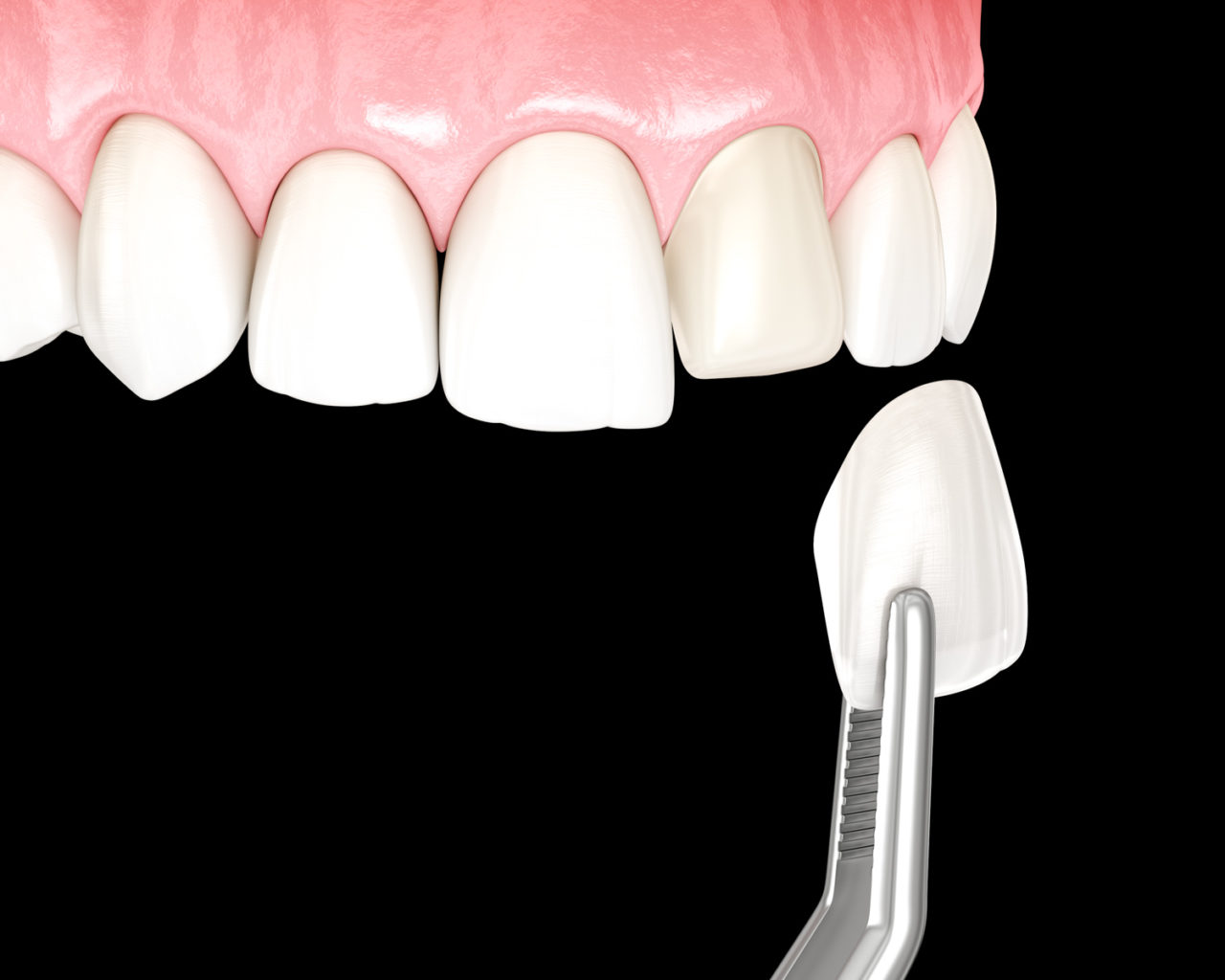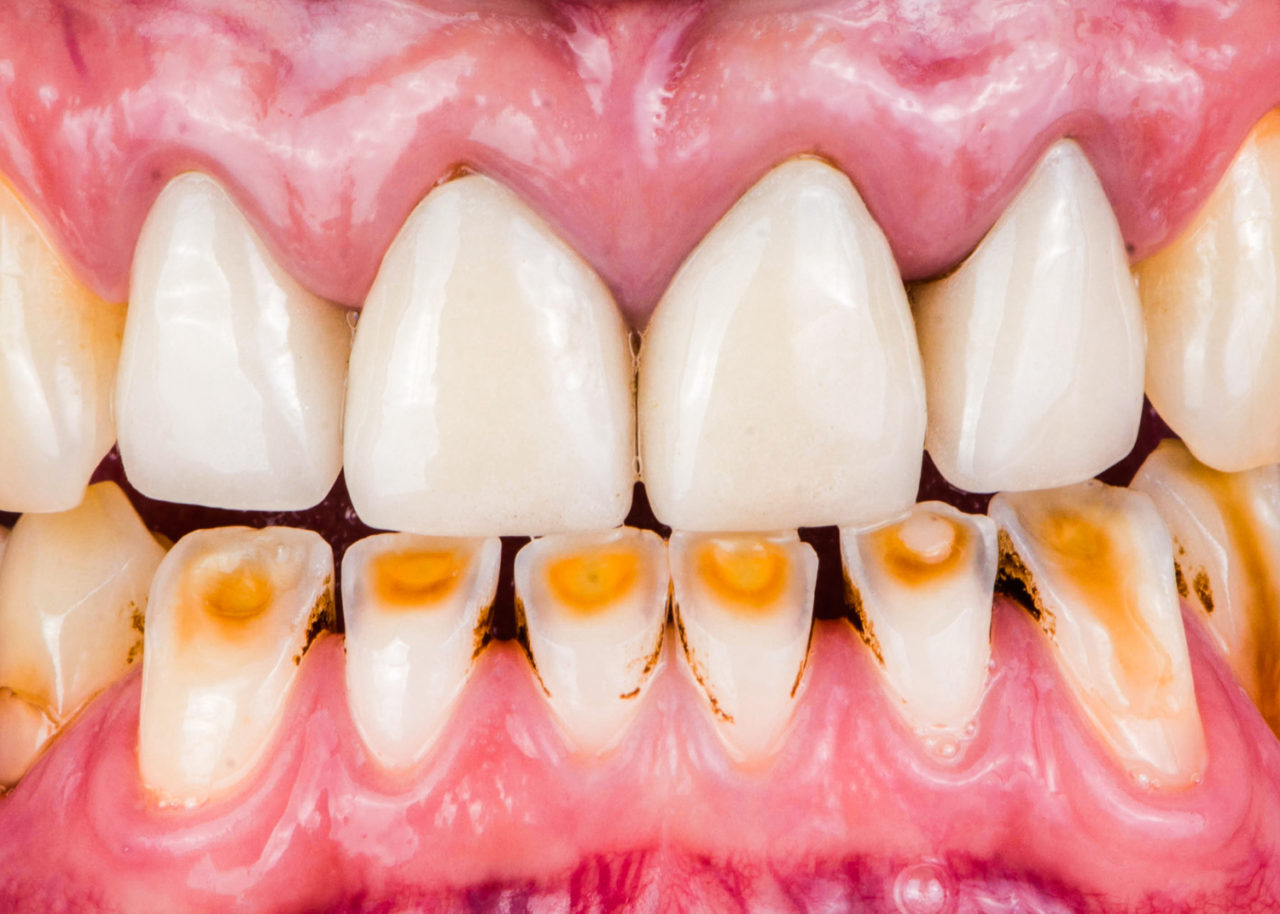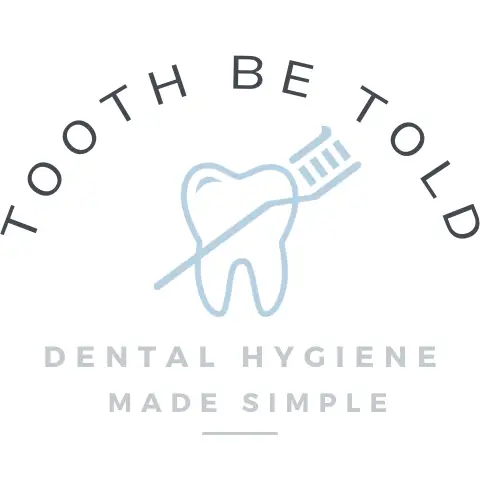
Dental veneers are permanent on the teeth, but they can fall off for multiple reasons. Patients who have sat in my dental chair who have had a veneer come off ask me why veneers fall off.
Below is a complete list of why dental veneers fall off;
1. Cavity (tooth decay) under the veneer decreases stability
A cavity can form on any natural tooth surface that comes in contact with the bacteria in our mouths. Tooth decay can start where the veneer meets the tooth and, if large enough, decrease the surface area in which the veneer has adhered to the tooth.
With a decreased surface area of attachment, the chance of the veneer coming off increases.
Maintaining good oral hygiene practices is very important to prevent decay and increase the veneer’s longevity.
2. Adhesive under the veneer breaks down/weakens
Over time, the adhesive used to attach the veneer to the tooth will start to degrade, and the bond will weaken. Weakening of the adhesive will contribute to the veneer coming off.
Although this happens slowly, the chance of failure increases as the years go on.
3. Bone loss/tissue loss due to gum disease
Gum disease causes bone and tissue loss around the teeth. If too much bone is lost, the teeth can become mobile, and more movement of the teeth will occur. The movement of teeth can affect how the forces of eating, clenching and grinding affect the teeth.
Differing forces can introduce new tension points, which can cause more force on the veneer, causing it to come off.
Read Now: Do Veneers Ruin Your Teeth? Dental Hygienist Explains!
Also, with bone loss and tissue loss around the teeth, the tooth’s roots will become visible, making a noticeable difference in colour between the root of the tooth and the veneer. This may be an issue for many people with veneers as they will not be as aesthetically pleasing.
4. Improper installation; moisture contamination
When adhering a veneer to the natural tooth surface, keeping the surface free of moisture is imperative for success.
This can result from poor isolation by the dental professional who applied the veneer.
If the veneer has come off shortly after having them placed (within the first couple of years), I will hope that the dentist could re-bond the veneer for little to no charge, as there is a high probability the reason for failure is poor/improper installation.
Applying too much adhesive, not ensuring the bite is okay, and not checking if there is too much force on the veneer when the teeth come together can contribute to veneer failure.
5. Grinding and clenching teeth puts excess force on veneer
Clenching and grinding are also known as bruxism. When our teeth come together and clench and grind, there is so much excess force on the teeth, which can cause the veneer to come off.
It is essential to talk with your dental professional if you know you’re clenching or grinding. Patients of mine who have signs of bruxism on their teeth signal that we need to have a conversation about the long-term effects of bruxism and the importance of wearing a night guard to protect the teeth.

The patient has veneers on the top four front teeth in the image above. Over time with bruxism, they have worn away the tops of the bottom front teeth. The yellow discolouration is exposed dentin that lays beneath the protective enamel layer.
Especially if my patients have veneers, using a nightguard is crucial if you have veneers or crowns on the front teeth. Studies conclude that habits such as bruxism are the number one unfavourable condition for dental veneer longevity.
Unfavourable conditions of dental veneers include 1) patients with parafunctional habits such as bruxism
https://www.ncbi.nlm.nih.gov/pmc/articles/PMC6311473/
Read Now: Is a Top or Bottom Night Guard Better? Hygienist Explains!
6. Eating Foods That Are Sticky or Hard Can Snap Off Veneer
Changing our eating habits and the way we eat is essential to increasing dental veneers’ longevity. Eating really sticky or hard foods can put too much force when biting down and cause the veneer to come off or even chip/break.
Even tough foods such as a sandwich with thick bread, the tearing motion of ripping the bread with the teeth can cause excess pull and force, causing the veneer to come off.
Foods to avoid biting into with veneers are;
- hard raw fruit and vegetables such as; carrot sticks, apples
- beef jerkey
- thick or toasted bread
- bread with nuts and seeds
- ice
- bone-in meat
- sticky candy such as; toffee
- thick potato chips or crisps
- popcorn
These foods can still be consumed if they are cut up and eaten in small bites that avoid using the teeth with veneers.
However, ice should never be chewed no matter if you have veneers or not!
7. Biting fingernails
Habits can be extremely hard to break, and one of the most common habits is biting our fingernails.
The force used to bite down and chew a fingernail can jar the teeth and be enough force to pop off the veneer. As well, the tearing motion can rip off the veneer.
If you bite your fingernails, try your best to at least reduce how much you do it if stopping altogether is too much. Habits are so hard to break when they have been ingrained in our lives for so long! Be easy on yourself, it takes time! 🙂 You can even look at different remedies to help stop biting your fingernails.
8. Opening packages/cutting tape with teeth
Your teeth are not tools. I have seen people open packages, cut tape and even open a bottle of beer with their teeth! I was horrified when my husband told me he could open a beer bottle with his mouth when I first met him!
It’s safe to say that he’s never done it since meeting me, as now he knows that it can break a tooth in half, and those who have veneers, break the veneer or cause it to come off!
The ripping, tearing motion of these actions not only can cause the veneer to come off but break/chip them.
9. Chewing on foreign object such as a pen
I’ve been guilty of mindlessly thinking and biting the ends of pens and pencils, especially when I am in deep thought.
Biting and chewing on foreign objects can cause excessive force, wear and tear, and breakage of the veneer. Even holding things will the teeth such and nails, sewing needles, and screwdrivers are included in things not to bite down on!
I hope you have found this helpful, and I’m sorry if you have had your veneers break or come off, and I hope you can get it fixed quickly.
Have a great day!
Holly 🙂
